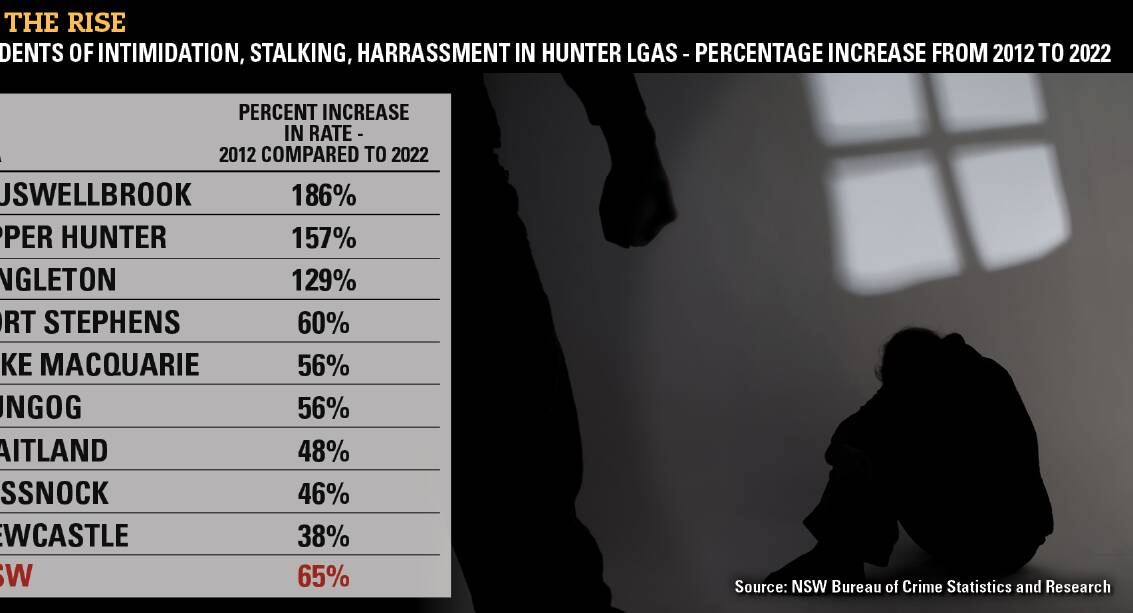
DOMESTIC violence-related incidents of intimidation and stalking have increased dramatically, more than doubling across the state over the past ten years. The number of incidents have increased significantly more than that in parts of the Hunter region.
In a Bureau of Crime Statistics and Research report released on Thursday, experts attributed the massive rise in to changes in the way the criminal justice system, starting with police, are responding to domestic violence.
The number of incidents police recorded from 2012 to 2021 have risen 110 per cent, from 8,120 to 17,063, the Bureau of Crime Statistics and Research (BOCSAR) report says.
BOCSAR executive director Jackie Fitzgerald said the incidents typically involved threats, intimidation and verbal abuse which have increased substantially across all parts of the criminal justice system.
In the Hunter, Ms Fitzgerald identified 1305 incidents in the 12 months to March 2013, compared to a count of 2039 in the year to March 2022.
Ms Fitzgerald said the incidents tended to involve more threats of violence - threats to kill or harm or sexually assault a victim, as well as verbal abuse. "We didn't find many instances of actual stalking," Ms Fitzgerald said.
Domestic violence-related stalking/intimidation reports recorded by police have doubled, police legal proceedings increased 164 per cent, court actions increased 64 per cent, and prison sentences nearly doubled, from 311 in 2014 to 610 in 2021. One in eight offenders were sentenced to a custodial penalty, the report says.
In individual local government areas in the Hunter, the count of domestic violence-related incidents of intimidation, stalking and harassment increased by between 186 per cent (in Muswellbrook) to 38 per cent (in Newcastle), compared to the NSW average percentage change in numbers of 65 per cent.
The rise appeared to reflect a systems-wide changing appreciation of the seriousness and breadth of domestic and family violence, rather than changing behaviours in the community, Ms Fitzgerald said.
"It's definitely playing out in Newcastle in a similar way to the broader state," Ms Fitzgerald said. "Domestic violence itself, in terms of incidents of assault coming to the attention of police have been pretty stable and we've confirmed that by also looking at victim survey results over a similar period, both in terms of people self-reporting, and assaults reported to police, so that seems quite contradictory to this doubling of stalk and intimidation.
"But over the past ten years we've also seen a different approach taken by police to domestic violence. They are much more likely to charge over domestic violence than they were ten years ago, and so the charge rate is up to about 68 per cent in the most recent figures when ten years ago it was closer to 55 per cent.
"When domestic violence incidents become known to police they're very inclined to take it to court, to treat it seriously and to prosecute, and there's a policy of pro-active response to domestic violence, that's their published policy.
"That combination of factors leads us to think that when incidents of threats and verbal abuse become known to them now, they are more inclined to record that ... as a criminal offence and therefore more likely to prosecute those matters than in the past."
The many more people being charged and convicted of these types of offences was driving an increase in prison sentences, growing from about 300 people imprisoned in 2014 to 610 last year, and that was a function of the volume of people coming through, Ms Fitzgerald said.
"Relative to other offences stalking and intimidation offences generally are treated quite seriously in the courts, so that 12 per cent imprisonment rate is higher than average in terms of offences in the courts so it is an offence that does receive particularly serious penalties - that has not changed over time."
Whether or not the state's law enforcement approach of zero-tolerance was effective in keeping people safer was yet to be determined, she said.
The statistics were gathered from NSW Police and criminal courts data bases, focusing on incidents flagged as 'domestic-violence related. Additional information was obtained by mining more than 12,600 police domestic-related stalking/intimidation narratives.
The report shows the increase has impacted Aboriginal people more than the general population. Legal proceedings against Aboriginal people increased 274 percent from 2012 to 2021, and in 2021, Aboriginal people accounted for 28 per cent of court finalisations and 52 per cent of prison sentences. Of the 272 adults in prison for domestic stalking/intimidation in December 2021, over a third were Aboriginal.







